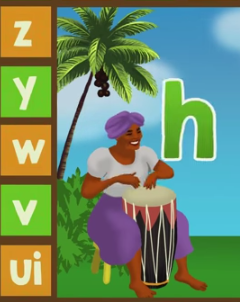We are thrilled to welcome our good friend Mandaly Louis-Charles to the HaitiHub blog. We first connected with Mandaly in 2011, when she helped us run our very first Creole Skype classes; more recently we’ve benefitted hugely as readers of her blog: Sweetcoconuts.
With an “Ask me anything” approach, Mandaly has built a learning platform for aspiring Creole-speakers across the web and is a major contributor to the Creole-Movement taking place across Canada, the U.S., and in Haiti. She most recently collaborated with M.I.T. professor Michel DeGraff to create a culturally-authentic Creole Alphabet song to help promote Creole-literacy for Creole speakers young and old alike.
- What prompted you to create the sweetcoconuts blog? Did you ever expect for it to get as big as it has? (Over 1.8 Million views!)

I started the sweetcoconuts blog a month after the Haiti earthquake in 2010. At the time there were a lot of medical and relief effort trips preparing to go there. They were looking for Haitian Creole translators. I had heard a couple of people complain about the lack of materials on the Haitian Creole language. Their small Haitian Creole pocket dictionary did not even have some of the most commonly used words. I then thought that it would be have been helpful if foreigners could have an interactive resource where they can find not only the words and translation but also commonly used expressions, phrases and usage of proverbs. Once I started the blog, I think that it became popular through word of mouth. Many people are thankful to have found it.
- What is your primary goal for the blog?
The primary goal is to basically have the resource available to foreigners that are traveling to work or volunteer in Haiti; to help them communicate with the people, and to inspire people to want to learn more about the language and to make them want to know and learn more about our culture.
- Can you tell us a little bit about how you became involved in the “Creole movement”? Can you define the idea behind the Creole movement for our readers?
In Haiti, most Haitians are raised speaking one language, and it’s Creole. But once it’s time to start school, the books are in French. The primary language of instruction, once, was French. You have to know some French, sometimes, to deal business at some government offices, buy an airplane ticket at a travel agent’s office, defend yourself in court, and give a speech at a wedding and more. Generally, Haitians think that you sound educated and cultured if you speak French. Since only about 5% of Haitians, if not less, speak fluent French in their home, we become generally ‘tongue –tied’, when it’s time to express ourselves in French. How can I impress you in French if I don’t know French? I cannot win an argument in a language that’s foreign to me. My vocabulary will be limited. I will lose the argument.
“The Creole movement is not about throwing the French language out. It actually embraces both languages. It promotes Creole as language, just like French.”
The Creole movement is about using Haitian Creole in all aspects of Haitian life in Haiti. It’s about not being intimidated by the elite group who speak French. It about a people being united by their mother tongue and having the freedom to speak and write the language without worrying about sounding stupid or illiterate.
- Why do you think it’s important for Non-Creole speakers to learn the language?
When some people talk about Creole, they say patois or pidgin as if the language is just slang. This could not have been further from the truth. There are many books of instruction written in Creole. Classes can be taught in Creole. There are music, poem, and awesome literature in Haitian Creole.
Creole is spoken by more than 11 million people. Haitian Creole is the most widely spoken. I can name a dozen countries where Creole is spoken: Seychelles, Guyana, Réunion, Martinique, Guadeloupe, Dominica, Trinidad, St. Lucia, Saint Thomas, Grenada, Dominica, and Haiti of course.
“Learning Creole is the bridge to sharing and participating in these Caribbean cultures. It’s a traveler’s dream.”
These countries are united by the Creole language, but they have their own history, culture and traditions.
- Your blog says “Ask me anything!”, and people generally do! Can you recall some of the most unique questions you’ve received? How did you respond?
I have received so many interesting questions. I recall someone asking if a certain Haitian tea can clean his/her urine in time for a drug test. I think my answer to that was essentially, “I don’t think so, and behave”.
Another interesting question, someone wanted to know what the sexiest Haitian Creole word was. I had to ask myself, “What makes a word sexy, is it the sound that it makes or its meaning? Even though these types of things are subjective, I gave an answer, anyways, of what word I thought was sexy. I believe I answered souke (to shake). It turns out that, at the time then, I had found the word appealing. Now, I can’t understand what was so sexy about it.
- If you had to choose one thing that makes Creole unique among other languages, what would it be? Can you give us an example?
The Haitian Creole language continues to be a work in progress. There are variations in the spelling and sound of some words. This happens because of regional variations. For example there are many different ways to write the word ede (to help): ede, ide, ende, ride. Some people just want to know, “Can I just learn one term and stick with it?” I think that it’s best to learn all the variations so that you may recognize them the next time you hear them in conversation or see them in writing.
- How do you think the conversation on Creole has change over the last 10 years? How do you think this will impact Haiti’s growth in the years to come?
I believe we are at a good place with the Haitian Creole language right now. A lot of progress is being made. More and more foreigners are speaking the language. Haitians are respecting it. Most of them do not think that it is the language of illiterates anymore. When Haitian Creole is integrated deeper into all aspects of Haitians’ social and professional lives in Haiti, we will see higher performance in schools, more opportunities for employment, improved communications between the people and the government and even better grasp of the French language.
8. When you and Dr. Michel DeGraff decided to create a new learning resource for early education Creole-speakers, what inspired you to begin with an alphabet song? (Learners: Check out the video below!)
A song can make learning fun. In that case we wanted children to identify with it. We wanted to give it cultural identity.
9. In addition to including the full Creole alphabet, the song is hugely successful in drawing from Haitian culture to create the rhythm and melody for the children to sing along to, and using vocabulary Haitian children will immediately recognize to go along with the sounds; can you elaborate on why this is so important?
 With the Creole alphabet song project, we weren’t just looking to have children learn a song of the Creole alphabet; we wanted them to have a connection with the song. They had been speaking Creole all their lives and hadn’t learn the alphabet of the language, in a song, until now. So we wanted to make it memorable. We were just delighted to use just the tanbou (conga) as the only musical instrument in this project. The tanbou is used to express different emotions in many dances, rituals, songs, and cultural traditions in the Haitian culture. It is the musical instrument that speaks to our soul. It was important that the words, pictures and sounds selected for teaching the alphabet letters were familiar the Haitian children and adults so that they absorb the concepts quicker.
With the Creole alphabet song project, we weren’t just looking to have children learn a song of the Creole alphabet; we wanted them to have a connection with the song. They had been speaking Creole all their lives and hadn’t learn the alphabet of the language, in a song, until now. So we wanted to make it memorable. We were just delighted to use just the tanbou (conga) as the only musical instrument in this project. The tanbou is used to express different emotions in many dances, rituals, songs, and cultural traditions in the Haitian culture. It is the musical instrument that speaks to our soul. It was important that the words, pictures and sounds selected for teaching the alphabet letters were familiar the Haitian children and adults so that they absorb the concepts quicker.
- Do you have any new resources we should be watching out for?
I have so many questions that were sent to the blog that haven’t been answered. These questions are mostly about request for lyrics of Haitian Creole. I am thinking to have a section, in the blog, where others may help with answering these questions
11. As an English and Creole speaker living in the U.S., can you tell us what language you most often think in? Or dream in?
Most of my dreams are from settings of my childhood. I came to the US around the age of 17. When my mom and dad were in the US making a living to support us we lived with my great aunt, Jeanne, in Arcahaie, a town on the west site of Haiti.
“My father used to tell me that the early years of your life are your first love, you don’t ever forget it. I relive my childhood in my dreams.”
Most of my elementary school years were spent there. No matter what the theme of my dream is, the setting is almost always in the house that I grew up in Arcahaie.
12. If you could choose one Creole phrase or proverb that all Creole-learners had to learn, what would it be? Why?
Haitian proverbs are always part of our daily conversation. They remind us of the wisdom of our ancestors. It’s always exciting to learn new proverbs. That’s why I carry a pen and notepad in my purse all the time. My friends are always sending me new Haitian proverbs and expressions. I have many favorites but I’ll share this one because it speaks of respect and consideration for all living things.
“Lè ou wè vye zo sou gran chemen, pa di li pa te janm ale sou tab.”
(When you see old bones on the main roads, don’t say that it never graced a table.)
Another version is Lè ou kontre vye zo nan gran chimen, konnen li te gen vyann anwo li.(When you come across old bones on the main road, know that it once had flesh on it). Everyone on this earth has an amazing story. So take time to look past their skeleton and walk in their shoes a little bit.
by Erin Nguyen on August 6, 2015
The team at HaitiHub is so grateful to Mandaly for her time spent answering our questions (Both those contained in this interview, and the many many questions we’ve sent to her over the years regarding language, culture, and anything in between!) She has been a great friend and colleague to us, and is a huge asset to the Creole Movement as a whole.
To have your questions answered, head over to her blog at http://sweetcoconuts.blogspot.com/ – really, ask her anything!


